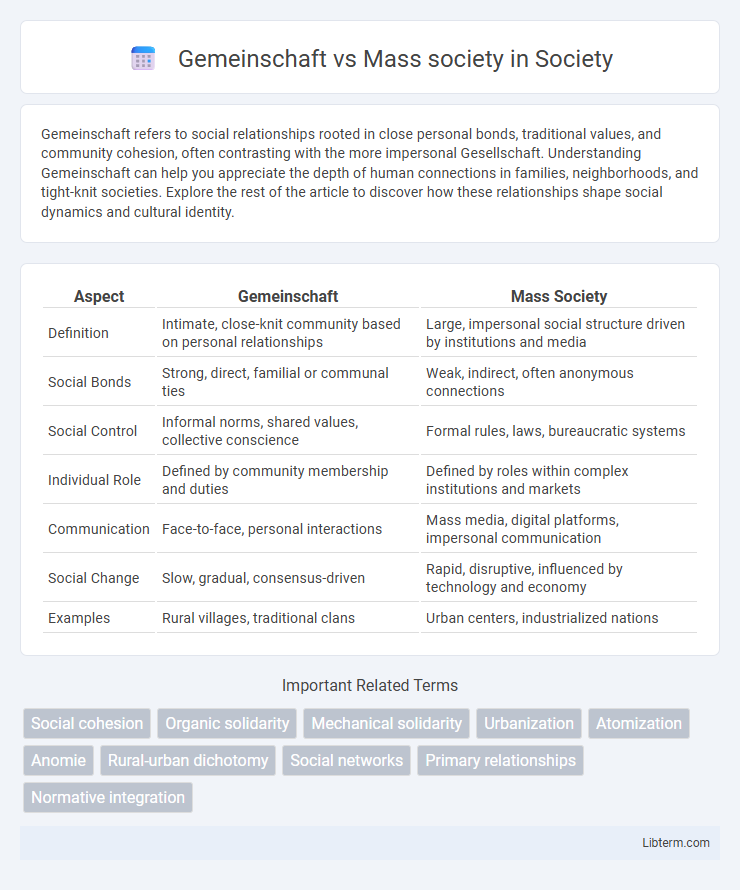Gemeinschaft refers to social relationships rooted in close personal bonds, traditional values, and community cohesion, often contrasting with the more impersonal Gesellschaft. Understanding Gemeinschaft can help you appreciate the depth of human connections in families, neighborhoods, and tight-knit societies. Explore the rest of the article to discover how these relationships shape social dynamics and cultural identity.
Table of Comparison
| Aspect | Gemeinschaft | Mass Society |
|---|---|---|
| Definition | Intimate, close-knit community based on personal relationships | Large, impersonal social structure driven by institutions and media |
| Social Bonds | Strong, direct, familial or communal ties | Weak, indirect, often anonymous connections |
| Social Control | Informal norms, shared values, collective conscience | Formal rules, laws, bureaucratic systems |
| Individual Role | Defined by community membership and duties | Defined by roles within complex institutions and markets |
| Communication | Face-to-face, personal interactions | Mass media, digital platforms, impersonal communication |
| Social Change | Slow, gradual, consensus-driven | Rapid, disruptive, influenced by technology and economy |
| Examples | Rural villages, traditional clans | Urban centers, industrialized nations |
Understanding Gemeinschaft and Mass Society: Definitions
Gemeinschaft refers to a social structure characterized by close-knit, personal relationships and strong community bonds, often found in rural or traditional societies. Mass society, by contrast, describes a large, impersonal social organization where interactions are more superficial and individuals feel isolated despite being part of a vast population. Understanding these definitions highlights the contrast between intimate social connections in Gemeinschaft and the fragmented, anonymous nature of Mass society.
Historical Context: Origins of Gemeinschaft and Mass Society
Gemeinschaft, rooted in Ferdinand Tonnies' late 19th-century sociological theory, originates from traditional, pre-industrial communities characterized by close personal relationships, shared values, and strong social cohesion. Mass society emerged during the industrial revolution and urbanization, marked by large-scale social structures, impersonal interactions, and the decline of traditional community bonds. The historical shift from agrarian economies to industrial capitalism fundamentally transformed social organization, leading to the rise of mass society as communal ties weakened.
Key Characteristics of Gemeinschaft Communities
Gemeinschaft communities are characterized by close-knit relationships, strong personal ties, and a shared sense of belonging based on tradition and common values. Social interactions are predominantly face-to-face, fostering emotional bonds and mutual support among members. These communities emphasize collective well-being over individualism, with social roles often defined by family, kinship, and long-standing customs.
Fundamental Traits of Mass Society
Mass society is characterized by large, impersonal social structures where individuals experience weak social ties and limited communal bonds. Fundamental traits include standardized cultural patterns, bureaucratic institutions, and communication networks that emphasize mass media over face-to-face interactions. This leads to social atomization and a decline in traditional Gemeinschaft values such as close-knit relationships and shared norms.
Social Bonds: Personal Ties vs Impersonal Relationships
Gemeinschaft is characterized by strong social bonds rooted in personal ties, including family, close friendships, and community connections, fostering a sense of belonging and mutual responsibility. Mass society features impersonal relationships where social interactions are formal, fragmented, and often mediated by institutions or mass media, leading to weaker social cohesion. These contrasting social bonds influence individual identity, social trust, and community involvement across traditional and modern societal structures.
Authority and Social Control in Gemeinschaft and Mass Society
In Gemeinschaft, authority is personal and rooted in tradition, with social control maintained through close-knit relationships and shared values. In Mass Society, authority becomes impersonal and bureaucratic, relying on formal institutions and legal systems to enforce social control. The shift from Gemeinschaft's informal norms to Mass Society's structured regulations marks a transformation in how authority and social cohesion are exercised.
Impact on Identity and Social Belonging
Gemeinschaft, characterized by close-knit, personal relationships, fosters strong social belonging and a cohesive identity rooted in shared values and traditions. In contrast, Mass society, marked by impersonal and large-scale social structures, often leads to fragmented identities and weaker social bonds due to anonymity and lack of intimate community ties. The shift from Gemeinschaft to Mass society impacts individual self-concept and social integration, influencing feelings of alienation and social isolation.
Modernization: Transition from Gemeinschaft to Mass Society
Modernization drives the transition from Gemeinschaft, characterized by close-knit, personal relationships and traditional social structures, to Mass Society, where impersonal, large-scale social networks dominate. Technological advancements, urbanization, and industrialization diminish community bonds, replacing face-to-face interactions with anonymous and indirect social connections. This shift results in individualization, social differentiation, and increased reliance on formal institutions over communal ties.
Advantages and Disadvantages of Each Social Structure
Gemeinschaft societies offer strong social cohesion and personal relationships, fostering trust and collective responsibility, but often limit individual freedom and social mobility. Mass societies provide diverse opportunities and cultural innovation due to large, impersonal networks, yet they can lead to social alienation, weakened community bonds, and increased anonymity. Each structure balances social integration against individual autonomy, affecting social stability and identity formation.
Contemporary Relevance: Gemeinschaft and Mass Society Today
Gemeinschaft relationships, characterized by close-knit community bonds and shared values, persist in contemporary societies through family units, local neighborhoods, and cultural groups despite widespread urbanization and digital communication. Mass society, defined by impersonal social ties and large-scale societal structures, dominates modern life in sprawling cities, online platforms, and globalized economies, often leading to social alienation and weakened communal connections. Understanding the ongoing tension between Gemeinschaft and Mass society informs current social policies aimed at fostering community resilience, social cohesion, and individual well-being in an increasingly fragmented world.
Gemeinschaft Infographic

 libterm.com
libterm.com